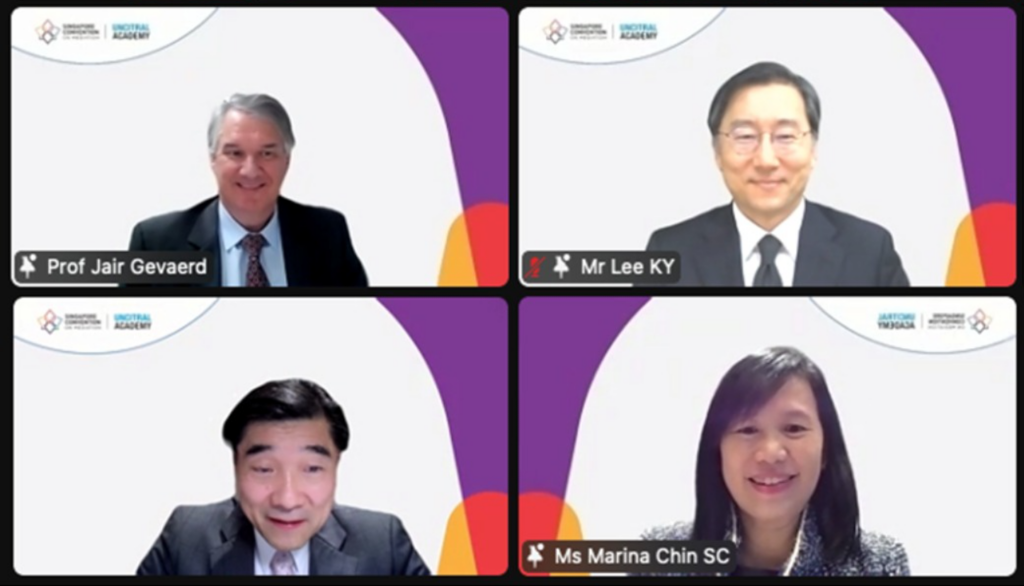SINGAPORE CONVENTION WEEK: Midnight Clauses and S.M.A.R.T. Settlement Agreements
By Ng Xin Yi
How does one make the most of ”midnight clauses” so that they’re not simply added as a last-minute afterthought, and what are the key principles and tips to bear in mind when drafting settlement agreements, which are quite often done at a late hour?
In the lively UNCITRAL Academy industry capability-building workshop, “Midnight clauses and S.M.A.R.T. settlement agreements: tackling delay, confidentiality and enforceability” held on 31 August 2022 during Singapore Convention Week, a panel comprising speakers and moderator from civil and common law jurisdictions spent nearly 90 minutes offering practical perspectives and considerations. Their tips included how best to advise clients in order to achieve positive and creative outcomes to the satisfaction of both sides, while addressing common user concerns towards mediation, such as potential delay, cost and loss of confidentiality.
The comprehensive discussion, organised by UNCITRAL and Singapore’s Ministry of Law with the support of the Singapore International Mediation Centre (SIMC), brought together Brazilian moderator, Professor Jair Gevaerd, and three speakers from various part of Asia: Ms Marina Chin SC from Singapore, Mr Kyung Yoon Lee from South Korea and Mr Haruo Okada from Japan. They touched on new trends and innovative solutions, while sharing their behind-the-scenes experiences in resolving complex situations in financial, insolvency, high-tech, construction and shareholder disputes.

MEDIATION’S GROWING POPULARITY
“There are 3 important points to note about mediation,” began Mr Okada, who runs his own practice, Haruo Okada International Law Offices, and is President of the Japan Association of Arbitrators and Chief Director of the Japan International Mediation Centre (JIMC-Kyoto).
Mr Okada highlighted that mediation is attracting worldwide attention and elaborated on the types of cases suitable for mediation.
“Cases relating to business, potential recovery and when there is a win-win situation…” continued Mr Okada. He explained that because mediation is fast and cost-saving, there has been an increase in the number of cases with a corresponding rapid rise in the value of cases being mediated as well.
CASE STUDIES
When asked by Prof Gevaerd to elaborate on cases suitable for mediation, Mr Okada highlighted a case that had been mediated last year under the JIMC-SIMC Joint Covid-19 Protocol which involved two companies from Japan and India.
Under this Protocol, two mediators were appointed: one from the Singapore International Mediation Centre who was of Indian ethnicity, and another from JIMC-Kyoto, to help bridge potential language and cultural differences. The mediation was a rousing success and resolved in two days, even though it was set down for three.
Another example: the US$1-billion dispute between South Korea’s largest private energy producer, POSCO, and US-based FuelCell Energy, which Mr Lee was involved in. The seven-year-long dispute spanned five arbitrations in London, Seoul and Singapore and two court cases in the US. It was resolved in 3.5 days in Seoul, facilitated by mediator George Lim SC, who is SIMC’s Chairman. (Find out how the case was resolved in this article featuring Mr Lim and opposing counsel.)
Long-time legal adviser to POSCO, Mr Lee of Kim & Chang, who recently trained to become an SIMC Specialist Mediator, is a rare transactional lawyer who worked closely with his Disputes colleagues on that mediation. Transactional lawyers help their clients negotiate deals and draft the contracts setting out parties’ intentions, including how any disputes which subsequently arise should be resolved.
“Once the parties have come to an agreement and gone home, the lawyers are still working deep into the night thinking about the clauses and provisions that should be included…” Mr Lee said. “That is why those provisions are called midnight clauses!” He chuckled.
DRAFTING TIPS
When it comes to drafting, Mr Lee suggested using tiered clauses such as Med-Arb provisions, which require parties to undergo mediation before arbitration or litigation.
“If not, it is going to be very difficult for the counsels to persuade the parties in dispute to go for mediation as there is no set rule imposed and anybody can agree on anything,” he explained. The original POSCO-FuelCell Energy contract did not contain a mediation clause.
Towards the end of a dispute’s journey where Disputes teams labour for hours to cobble together a settlement after an in-principle agreement has been reached, Ms Chin of Tan Kok Quan Partnership offered this personal tip to avoid the all too-familiar frantic late-night scenario: “Before the mediation, I like to think about the clauses that would appear in the settlement agreement to prevent burning the midnight oil if possible.”
This, she said, would give her a clear idea on where she wanted the mediation to go in terms of outcomes.
Not only should a settlement agreement be based on S.M.A.R.T. (specific, measurable, attainable, realistic and timely) principles, reminded Prof Gevaerd, Ms Chin added that it should also comply with the requirements of the Singapore Convention on Mediation to ensure future enforceability.
ENFORCEABILITY, CONFIDENTIALITY & CREATIVE SOLUTIONS
While enforcement is usually not an issue since a settlement agreement is arrived at with the consent of both parties, Mr Okada pointed to the lack of precedents on this point and reminded the audience that some remedies may not be enforceable in certain jurisdictions.
Prof Gevaerd asked whether confidentiality in the mediation process was a concern. Ms Chin said that it was not an issue in Singapore as there were confidentiality clauses in both mediation and settlement agreements, with most documents presented during the mediation labelled ‘without prejudice’.
All of the speakers agreed that mediation has more pros than cons.
“Parties are into the idea of mediation as it has no boundaries and is very flexible.” Mr Okada replied.
Ms Chin nodded, highlighting that the basis of mediation is to focus on the relationship between the parties rather than the contract details.
“If parties focus on the relationship aspect of the mediation, it can lead to an increase in creative solutions and parties can salvage their relationships,” she said.
“Think of the process of mediation as splitting a pie,” she illustrated. “Both parties want the same pie. Through mediation, you not only get the portion of the pie you want, you can also get additional incentives, like a drink perhaps.”
In the US$1-billion POSCO-Bio FuelCell case that Mr Lee was involved in – SIMC’s largest successful mediation so far – it even resulted in future business for the parties.
If there was one big thing to come out of the workshop, it was this: that mediation, when used as part of a whole suite of dispute resolution tools, can result in achievable outcomes to the satisfaction of parties. And that’s certainly something worth raising a glass to!

